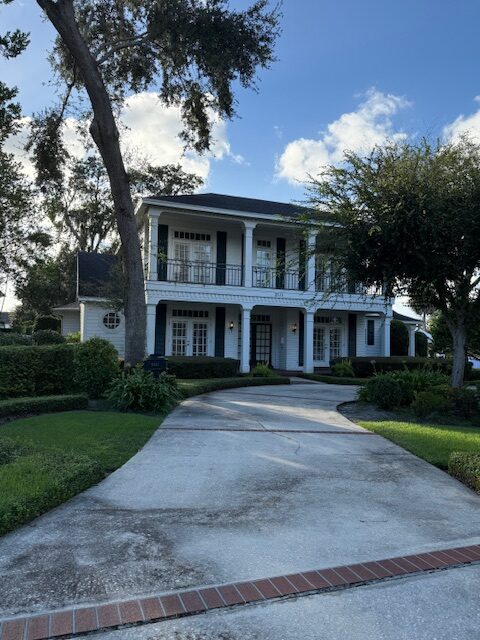
by Beth Kassab | Oct 9, 2025 | City Commission, News, Zoning and Development
P&Z Board Approves Racquet Club Expansion with Multiple Conditions
The plans must still win approval from the City Commission
Oct. 9, 2025
By Beth Kassab
The Winter Park Racquet Club made it over the first hurdle this week toward an expansion in the neighborhood known as “the Vias,” one of the city’s poshest enclaves between Lake Maitland and Temple Drive.
In a 5-1 vote, the Planning & Zoning Board approved plans with three new conditions to tear down the white-columned two-story home at 2111 Via Tuscany and allow the private club to build a larger one-story building to house a fitness center, locker rooms, tennis shop and offices.
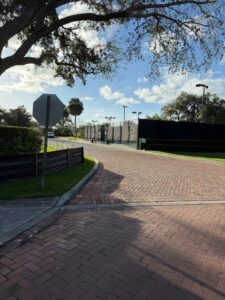
A view of the club’s pickle ball courts from Via Tuscany.
A crowd of neighbors — some who have planted red signs that say “Stop WPRC Commercial Expansion in our Neighborhood” in their front yards — attended to meeting to speak against the project with some comparing the tenor of the lights and activity at the club to a “Walmart” or “McDonald’s.”
Chairman Jason Johnson was the lone dissenting vote. Vashon Sarkisian, Charles Steinberg, David Bornstein, Alex Stringfellow and Michael Dick voted in favor. Bill Segal was absent.
Johnson said the changes appear as “commercial creep” in a residential area and said the term “sprawling campus” is “probably not an inaccurate description of what has happened with the club” that dates back to 1953.
“Is that to be expected?” Johnson asked. “Maybe, I guess? But this does sit in the middle of a residential neighborhood and at some point you’ve got to say I think it’s enough.”

A rendering shows what the new Winter Park Racquet Club building will look like at 2011 Via Tuscany. The white home pictured above will be torn down.
The project and conditions must ultimately be approved by the City Commission.
Planning & Zoning members added the following conditions:
- The circular driveway in front of the new building will be limited to 12-feet wide at the entry and exit points and 14 feet in the interior. That’s a reduction from the 20-foot driveway proposed by the club after neighbors and board members expressed concern the space would essentially serve as a parking lot. The club’s original proposal called for striped parking in front of the new building, but it revised those plans after hearing concerns last month.
- The club must conduct a photometric study or an analysis of the lights emitted by the club, including pickleball and tennis courts, to make sure it’s compliant and does not interfere with nearby homes.
- Play on the pickleball courts, which sit closest to Via Tuscany, must end at 8 p.m. instead of the current 9 p.m. cutoff.
City staff also called for additional conditions such as the driveway access on Via Tuscany be an entrance-only; the club can not increase its membership; hours of operation for the new building will be 7 a.m. to 8 p.m. for the new building; no new lighting can be added in the grass parking lot and the new paved section must use “low-scale bollard fixtures rather than traditional pole-mounted lights;” all non-safety required lights be off by 10 p.m. daily and the removal of two oak trees result in double the typical compensation.
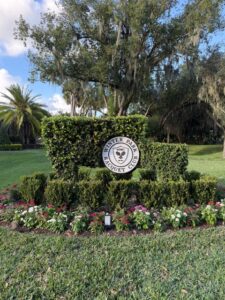 The club’s general manager did not immediately return a call for comment on the new conditions.
The club’s general manager did not immediately return a call for comment on the new conditions.
Rob Carter, the club’s volunteer president, said at the meeting that the club serves mostly Winter Park families, many who live in the neighborhood and walk or bike there. The home that will be torn down, he said, is outdated and will be replaced with a “safer one” that is compatible with the neighborhood and will not increase the intensity of the club’s operations.
“I do take some offense to the idea that we’re not trying to be a good neighbor,” he told the board, emphasizing that he incorporated residents’ feedback into the latest proposal and has offered to meet with people who live nearby and have concerns.
Demolition on Isle of Sicily
The P&Z board also approved plans by owners Kamran and Mina Khosravani for a new 10,400-square-foot home at 3 Isle of Sicily, meaning the current house originally built by famed local architect James Gamble Rogers II will be torn down.
The original home known as Four Winds dates to 1930 and sat at just 1,800-square-foot in the French provincial style. But the home had been altered significantly over the years and Jack Rogers, an architect and son of Gamble Rogers, said the damage to its integrity and history had been done long ago.

A rendering shows the proposed new home at 3 Isle of Sicily.
The project was approved unanimously by the board with little discussion and no public comment.
Over the years the number of Gambles Rogers homes in Winter Park has dwindled from about 50 to 15 or 20, Rogers said.
WinterParkVoiceEditor@gmail.com
To comment or read comments from others, click here →

by Beth Kassab | Oct 7, 2025 | City Commission, Historic Preservation, News, Zoning and Development
Upcoming Demolitions: At Racquet Club, a Gamble Rogers House and Park Ave Apartments
Two city advisory boards will consider the three projects this week
Oct. 7, 2025
By Beth Kassab
One of Winter Park’s most exclusive hang-outs wants permission to demolish a 5,400-square-foot two-story building at the front of its property and build a larger one-story structure to house a fitness center, locker rooms, tennis shop and offices.
The Planning & Zoning Board will consider the proposal Tuesday evening by the Winter Park Racquet Club, a private club that dates back to the early 1950s on Lake Maitland that offers swimming, dining, pickleball and tennis with initiation fees that run upwards of $22,500, according to one document that advertised a job posting there.
The changes at 2111 Via Tuscany have drawn criticism from neighbors on the residential street who say they are worried about commercial-like development, traffic and noise. As a result, the proposal has gone through revisions since the concept was tabled at the Sept. 2 Planning & Zoning Board meeting.
“The style will add cohesion to the rest of the club buildings, including the original clubhouse which was designed by [local architect James] Gamble Rogers,” read a description submitted by the club. “It will also mimic the aesthetics of neighboring homes, and the intent is for people driving by to assume that it is a residence that has been here all along.”
Residents expressed concerns about the disruptions to be caused by construction, light pollution, parking and other issues, according the minutes of a neighborhood meeting.
“I am extremely concerned that this project continues to seek to convert this house into a commercial multi-use facility,” Marci Greenberg, who lives across the street, wrote to the city, one of a number of emails received about the project. “With the new plans, there will still be a significant increase in traffic, parking in front of the building (as the new circular drive is 20 ft wide which is as wide as Via Tuscany) and an increase in noise. The current house, as such, contributes to the character and ambiance of the neighborhood. The proposed building looks commercial and detracts from our residential neighborhood.”
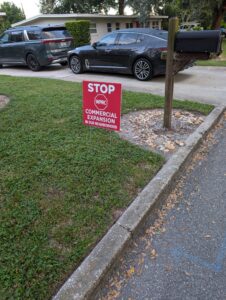
A sign in the neighborhood near the Racquet Club opposes changes there.
The club manager did not return a call for comment, but documents say the club is on a “membership waitlist” and is not accepting new members, meaning the project is not intended to allow any growth or expansion of services.
In response to concerns, the club has removed from the plans new parking that was to be added in front of the building and replaced it with a circular driveway.
City staff is also requesting other conditions such as the hours of operation remain the same, no new lighting be added and most exterior lights (other than for safety purposes) be turned off by 10 p.m.
Noise issues are also being addressed, according to the staff report.
“[The club] is proposing a six-foot acoustic sound barrier behind the eight-foot podocarpus hedge in front along Via Tuscany to screen the parking and buffer the noise concerns raised by the neighborhood,” it said. “This sound barrier will be the same barrier used to buffer the pickleball courts that is designed to reduce noise levels in outdoor settings and is made of a dense, soundproofing composite, and unlike a solid and rigid concrete wall, it both blocks and absorbs sounds more effectively.”
Another Gamble Rogers House Likely Gone
Not far from the Racquet Club is a secluded peninsula that stretches into Lake Maitland from its eastern shore called the Isle of Sicily — one of the city’s richest streets. James Gamble Rogers II, who also designed the racquet club, constructed the first home on the isle about 1930, an 1,800-square-foot French provincial home known as Four Winds that the famed architect lived in with his family until 1949.
Now the house at 3 Isle of Sicily is likely to be torn down as part of a plan to builder a larger home on the property.
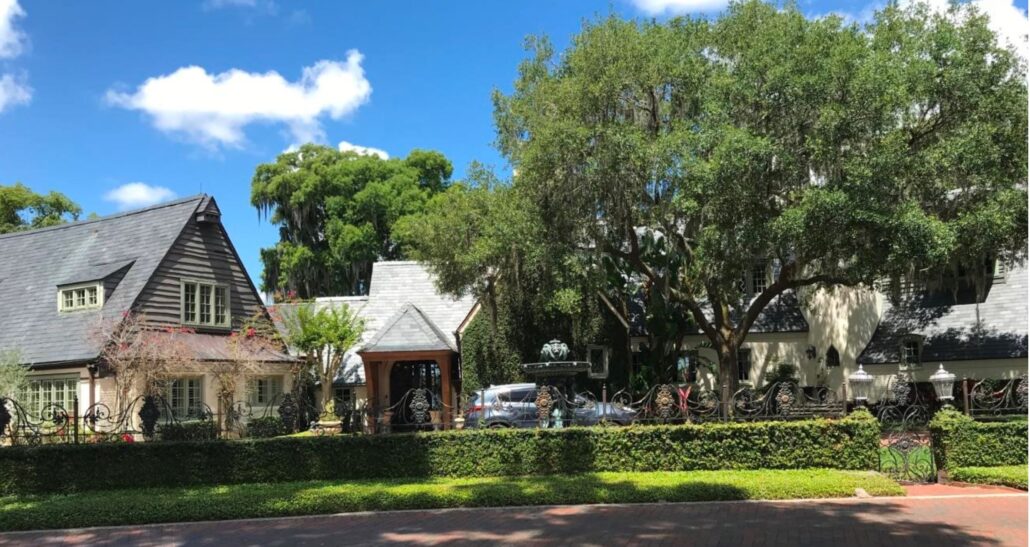
A view of the home at 3 Isle of Sicily today as recorded by the Orange County Property Appraiser.
Over the years, the house was renovated extensively and now sits at more than 7,000-square feet.
Owners Kamran and Mina Khosravani, who acquired the property in 2011, are looking to build a new home that will top 10,400 square feet.
The home is not on the city’s historic register so the owners don’t need permission to demolish it, but will ask the P&Z Board today for approval of the new lakefront construction.

A rendering shows proposed new construction at 3 Isle of Sicily.
Jack Rogers, architect and son of Gamble Rogers, said he’s sorry to see the house come down, but it hasn’t looked like the original in decades.
“Unfortunately, the damage was done 50 or more years ago,” Rogers said. “The original house is completely gone.”
His father, who is also known for the Florida State Supreme Court Building in Tallahassee and the Olin Library on the Rollins College Campus, built about 50 houses in Winter Park, he said. His papers and plans are preserved at the Winter Park Library.
“There’s probably 15 or 20 left and eight or 10 are absolutely precious and we seem to be losing them at the rate of one or two a year,” Rogers said. “We still have several wonderful examples.”
Park Ave Apartments Face Demo for Townhomes and Synagogue
The apartment buildings dating back to 1922 known as El Cortez could be demolished to make way for new townhomes and a new synagogue if the Historic Preservation Board approves a proposal up for consideration on Wednesday.
The board tabled the request at its Sept. 10 meeting in order to see if the developer could save one of the three buildings at 210 E. Morse Blvd. that are part of the Interlachen Avenue Historic District. The property is also the last R-4 zoned land just off Park Avenue that has yet to be redeveloped.
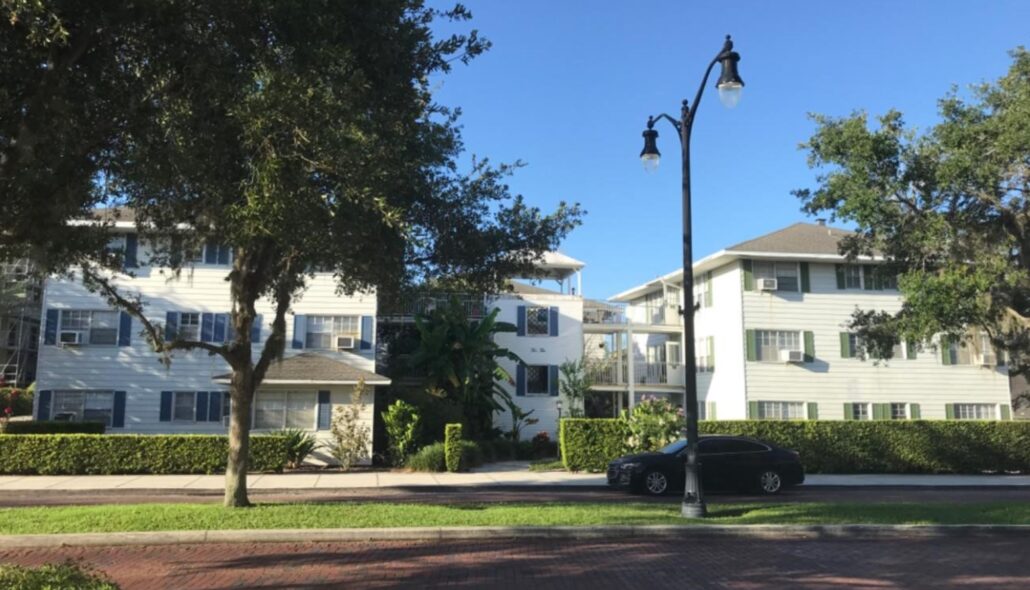
The El Cortez Apartments along Morse Boulevard.
The city discourages demolition of so-called “contributing structures” to historic districts such as El Cortez, but does approve knock-downs when preservation isn’t feasible.
The property owner and applicant for the project, a company called El Cortez LTD and managed by AGPM founder Scott Zimmerman, said the buildings represent a “frame vernacular style,” but have been significantly altered over time with no original exterior materials or features remaining.
The new development would create townhomes on Morse and a synagogue along Knowles Avenue. Staff received 32 letters in support of the project and one against, according to documents related to the meeting.
In the 1920s the building were constructed as upscale apartments amid growing demand for more housing in downtown Winter Park and near Rollins College. Over the years, a number of notable people lived there, according to National Register of Historic Places documents, such as “physician Benjamin Hart; Christopher Honaas, director of the Rollins College Conservatory of Music; Flora Magoun, secretary to the Conservatory; Margaret Windau, district director of the Florida Welfare Board; Helen Drinker, proprietress of a women’s fashion shop on Park Avenue North; and William Stein, a Romance Languages professor at Rollins College of Jewish descent who had recently immigrated from Austria to avoid Nazi persecution.”
Rogers said his dad told him he also stayed at El Cortez while Windsong, the Isle of Sicily property also likely set for demolition, was being constructed.
City staff is recommending approval of the project with the following conditions: A historic marker be placed there to commemorate the historical significance of the property and that the demolition not occur until the owner has a building permit from the city to ensure development plans don’t change between the time of the tear-down and new construction.
New Historic Survey Considered
The Historic Preservation Board will also on Wednesday consider a contract with Orlando-based KMF Architects for $75,000 to survey the city’s historic assets.
The proposal calls for updating the 2001 and 2013 surveys and will include an evaluation of Mid-Century Modern architecture (1950s-1970s), a era that hasn’t previously been surveyed citywide.
The work on Mid-Century Modern work will include a focus on Orwin Manor “to support the city’s consideration of a potential historic district designation.”
Four historic districts already exist in Winter Park — Downtown, College Quarter, Virginia Heights East and Interlachen Avenue — and those will be evaluated to determine if any non-contributing buildings now meet criteria for contributing status.
The survey will update records and remove properties on previous surveys that have since been demolished to produce a detailed report with photos that is both “informative and user-friendly,” according to the architects’ proposal.
WinterParkVoiceEditor@gmail.com
To comment or read comments from others, click here →
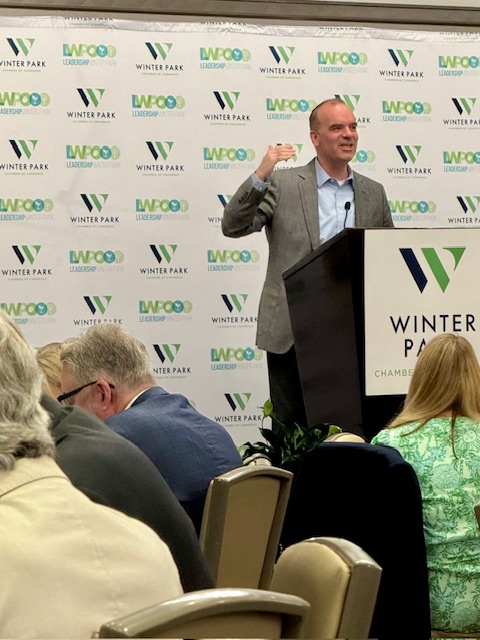
by Beth Kassab | Sep 19, 2025 | City Commission, Election, News, Uncategorized, Zoning and Development
Rethink Zoning Laws? Author Argues Rules Impair Upward Mobility
The Winter Park Chamber offered a zoning history lesson at its annual Outlook luncheon and set the stage for a contested city commission race with Michael Carolan likely to run against Elizabeth Ingram
Sept. 19, 2025
By Beth Kassab
Winter Park Chamber of Commerce President and CEO Betsy Gardner called on city leaders and residents to rethink zoning laws that she says have protected anti-development interests and blunted the opportunities for new housing in Winter Park.
Gardner said the city’s desire to remake Fairbanks Avenue near Interstate 4, now part of the Community Redevelopment Agency, is Winter Park’s next chance to prevent more strip centers and encourage the kind of growth that will attract families and new residents.
“This conversation about land use is also a conversation about who gets to belong,” she said, though she added, “We do not support the replication of the density we see in Maitland.”
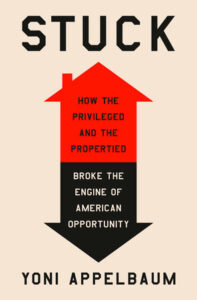
Yoni Appelbaum, pictured above, spoke at a lunch hosted by the Winter Park Chamber of Commerce on Friday.
Gardner’s remarks came at the chamber’s annual Outlook lunch, which explores topics related to economic development. This year’s keynote speaker was Yoni Appelbaum, who wrote, “Stuck: How the Privileged and the Propertied Broke the Engine of American Opportunity.”
Appelbaum, also deputy executive editor of The Atlantic and a historian, discussed how Americans “invented a profound human freedom” known as upward mobility. For more than a century, people were free to move beyond the station in life they were born into and toward prosperous city centers with jobs, social currency and a solid supply of housing stock.
That meant families moved many times, each time upgrading the kind of home they lived in.
But that’s not the case today, he said, as housing is often unaffordable and hard to come by in the places considered most desirable because of proximity to jobs and lifestyle amenities. (Case in point: Winter Park, where the median housing price is $700,000 or more, according to some sources.)
“Americans have stopped moving to the most prosperous places. People now move away from those places and to where the housing is cheap,” Appelbaum said. “Many have the sense that something has gone wrong in their lives .. that some element of the American promise has been broken.”
That’s the kind of loss of community and disenfranchisement credited with sweeping President Donald Trump into office and remaking the focus of the Republican Party.
Appelbaum stayed away from politics in his talk, but said the root of that shift dates back to the beginnings of zoning laws that came about as a way for those already settled in a place — mostly rich and white homeowners — to keep out others who were new and different.
He pointed to early laws in Modesto, CA that segregated Chinese laundry workers into what ultimately became known as “Chinatown” because white homeowners did not like that the workers were also living in their places of business. In 1885, Modesto outlawed laundry facilities “except within that part of the city which lies west of the railroad track and south of G Street,” the book reads.
And zoning laws, often dictating where certain types of businesses could operate, were born.
Later came height caps on buildings in New York City to drive up prices and push sweatshops farther to the outskirts. And historic preservation laws in Charleston, S.C. that he says served to stunt the city economically in the name of preserving a past that depended on enslaved people.
“What I find useful about the past is the ability to imagine different presents and different futures,” he said. “I am not here to tell you to abandon historic preservation or abandon zoning. What I do want for us to all think about is what we’re all after.”
In one passage of his book he discusses how he can see three large apartment buildings going up out his own window that will combine to a couple thousand new units, including more than a fifth described as “affordable.”
“Like all new developments, it leaves a good deal to be desired,” he wrote. “The architecture strikes me as blandly corporate. Local regulations, historic preservation and participatory planning have combined to limit the development on the site to just a fraction of what it might have held … Although I have little affection for cookie-cutter six-story apartment buildings, I don’t want to repeat Veiller’s error of mistaking my own aesthetic judgments for the public good.”
Those apartments, he noted, will mean upward mobility for some families.
Gardner said what happens in the Fairbanks corridor is up to residents and called on attendees — which included Mayor Sheila DeCiccio and commissioners Craig Russell, Marty Sullivan and Warren Lindsey along with city administrators — to use their power in the voting booth in March when two city commission seats are on the ballot.
At a recent workshop commissioners discussed potential rule changes, including lowering transportation impact fees, to encourage development. There appeared to be support for “quality, mixed-use development with a multi-family, workforce housing component, and to develop a comprehensive approach with the Planning and Zoning Board and Economic Development Advisory Board,” according to minutes of the meeting.
In a brief interview after the program, Gardner told the Voice that many people “lost trust” in the public process after the original development guidelines for the Orange Avenue Overlay were overturned, in part by DeCiccio and Sullivan.
Asked who she would support in the March election, she introduced attorney Michael Carolan, chairman of the real estate department at Winderweedle, Haines, Ward and Woodman, as a candidate for Seat 1 on the commission to replace Sullivan, who is retiring after two terms.
Carolan, who was chairman of the chamber board in 2020 and has also served on the board of the Coalition for the Homeless in Central Florida, said he plans to run but has not yet made it official by turning in paperwork to the city clerk.
Elizabeth Ingram is also seeking Sullivan’s seat and officially launched her campaign this week with an email to residents that said she is committed to “protect the qualities that make Winter Park special — its historic charm and small-town character, parks and recreation, and strong sense of community — while planning responsibly for the future.”
The trained opera singer currently serves on the Public Art Advisory Board and led the Dommerich Elementary Parent Teacher Association and is the only person who has officially opened a campaign account so far.
Russell, who serves in Seat 2, has said he plans to seek re-election.
The official qualifying period for the election runs from Dec. 1 to Dec. 8.
WinterParkVoiceEditor@gmail.com
To comment or read comments from others, click here →
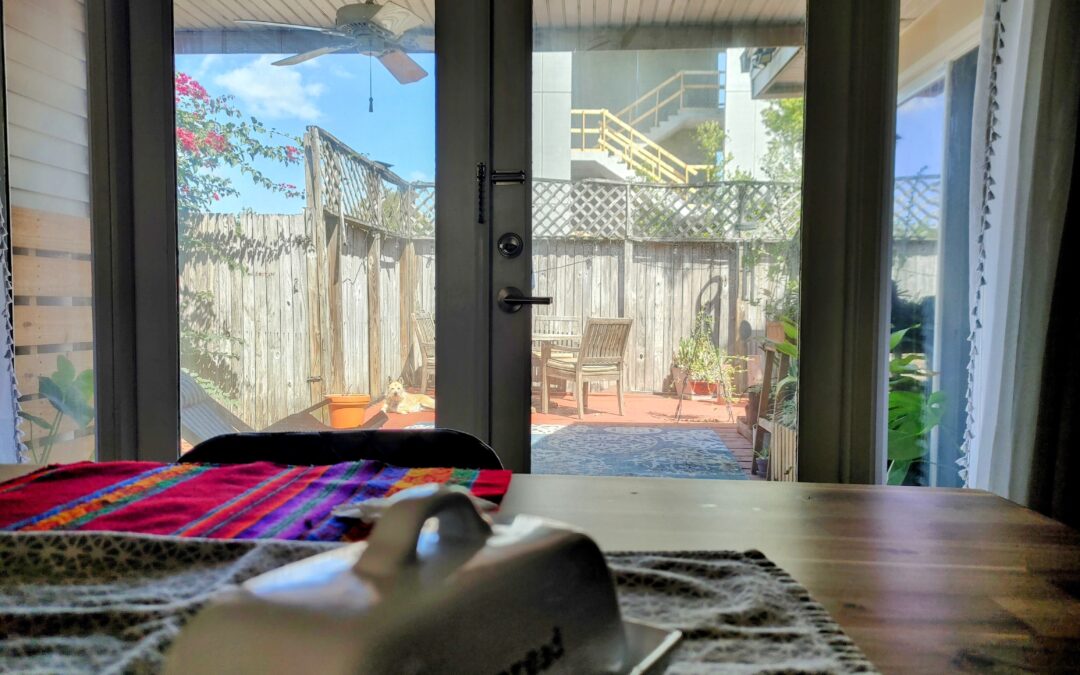
by Beth Kassab | Mar 28, 2025 | City Commission, News, Zoning and Development
Residents Fear Noise from Pickleball Courts Planned Behind Homes
The racket sport is wildly popular but its addition to the Ravaudage development, neighbors say, could bring a near constant drone of ball whacks
March 28, 2025
By Charles Maxwell
Residents who live behind the Ravaudage development where a Life Time Fitness is constructing at least 10 pickleball courts say the city and developers aren’t doing enough to blunt noise and other impacts from the project.
The complex of indoor and outdoor pickleball courts are part of the new 85,000-square-foot health club facility, an estimated $48 million project, slated to open in 2026. The mixed-use development off Lee Road and U.S. 17-92 already includes a Miller’s Ale House, a hotel and other office and retail space.
“Pickleball is a great sport, but it does have a very bad byproduct,” Mark Russell, who has lived in the Park Green Place townhomes for more than 25 years, told the City Commission at a meeting last month. “The hit of the ball on the paddle creates about an 1100-hertz spike, that’s about 70 to 95 decibels, equivalent to a vacuum cleaner to a subway train.”
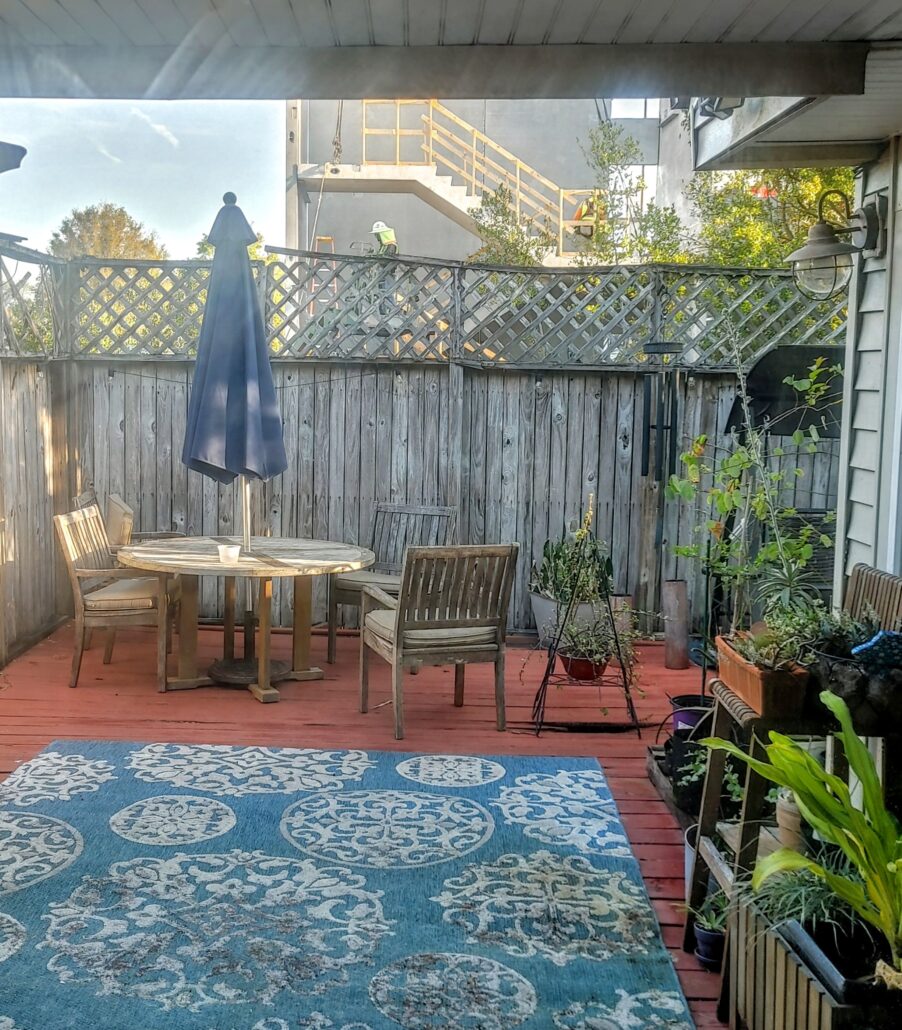
The views from David Adhira’s patio and dining room table (above) show the staircase of a parking garage under construction at the Ravadauge development. (Photos courtesy of David Adhira)
Russell cited an article from the New York Times in which a York, Maine resident who lives across the street from a private pickleball club said that “having a pickleball court in your backyard is like having a pistol range in your backyard. It’s a torture technique… living here is hell.”
David Adhira, another resident of Park Green Place, said plans show the courts will be just 50 feet from his home. Photos taken from his dining room table and patio show a portion of a staircase for a new parking garage that appears just over the fence from his property line. He told commissioners he’s worried about the toll of the sound from the pickleball courts. He worries about listening fatigue, stress, anxiety, sleep disruption and poor concentration.
Adhira said the construction behind his home is already disrupting his daily life.
“I have observed and documented tangible structural damage to my ceilings, while kitchen plates and glassware shuddered, doors and floors vibrated, and keyboards rattled on our desks,” he said. “I’ve been woken up countless times by the noise, vibrations, and screaming from the construction site, resulting in poor sleep for weeks on end. Even worse may be phantom noise, or auditory hallucinations.”
Commissioners asked Planning & Zoning Director Allison McGillis to meet with residents and the developer to consider solutions.
She told the Voice that the developer shared updated landscape plans for the south side of the Life Time facility, which borders Park Green Place.
The plans include additional layers of shrubs and trees to help reduce the noise and light expected to be produced by the facility.
“They are not proposing additional sound barriers at this time, but have stated that if additional measures are needed once they are operational, an option would be to install an outdoor acoustical barrier such as Acoustifence on the court fencing.” McGillis said. “Staff is going to propose a ‘check-in’ at 90 days and 180 days after they are operational to determine if the additional acoustical barrier is needed.”
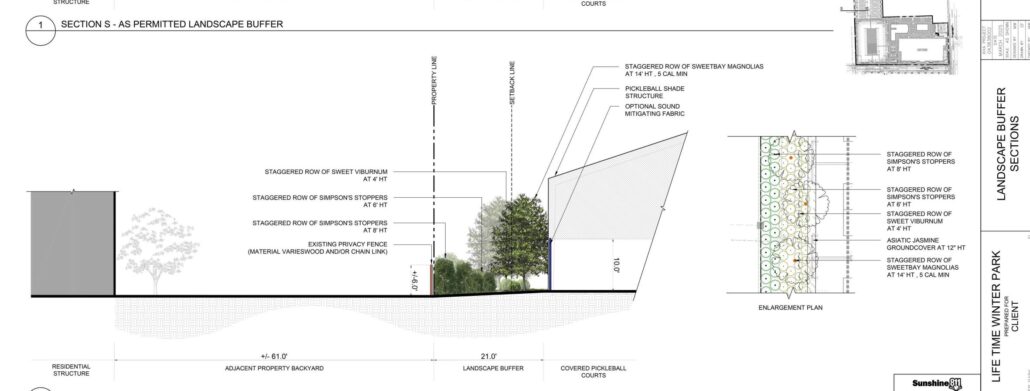
A section of plans shows the proximity of the courts to the homes and the proposed landscape buffer.
Adhira said he reached out to commissioners and Mayor Sheila DeCiccio in an email on March 17 because he is not satisfied with the changes proposed by the developer. But he has yet to hear a response.
“An acoustic-fence and a scattering of bushes will not counteract the level of noise projected from these courts,” he wrote. “Waiting three to six months after the facility opens to collect obvious data and possibly consider changes, as though this were an experiment with no legal precedents, is either incredibly naïve or cruel.”
WinterParkVoiceEditor@gmail.com
Charles Maxwell graduated from Winter Park High School and Florida Atlantic University with a BA in Multimedia Studies. His work has appeared in the South Florida Sun Sentinel and The Boca Raton Tribune, and he is a contributing writer for Keeping it Heel on the FanSided network.
To comment or read comments from others, click here →

by Beth Kassab | Jan 22, 2025 | City Commission, News, Zoning and Development
Dispute over lake view comes down to single palm tree
The commission also applauded the service of Jeff Briggs and heard an update on the negotiations over school resource officers
Jan. 22, 2025
By Beth Kassab
Jeff Briggs, retiring planning director, received a standing ovation Wednesday from the City Commission and those in the audience as he capped 47 years at the city of Winter Park.
Briggs, who is officially retiring this month after a year-long consulting stint with the city, is known for helping to define Winter Park’s unique look and feel through 11 mayors and 32 commissioners.

Jeff Briggs speaks to the commission chambers as Mayor Sheila DeCiccio looks on.
He said Wednesday marked his 1,126th City Commission meeting and joked, “How much suffering can one person take?”
Briggs thanked the commission and the city staff and noted that planning and development tends to be the most controversial topic in the city, an observation that was evidenced later in the meeting when he defended — and the commission upheld — one of his final acts on the job — enforcing landscaping conditions on a lakefront homeowner who neighbors said is detracting from their own water views.
Can a palm tree block a lake view?
The debate over landscaping on Virginia Drive recieved the most air time Wednesday with commissioners ultimately denying an appeal from a homeowner who argued his palm tree did not violate a condition by the Planning & Zoning Board to keep landscaping under 6 feet. The special conditions came about for the property in 2021 when the P&Z board allowed the homeowner to construct his home closer to the lake shore than typically allowed.
Hedges on the property line are also taller than 6 feet, but the homeowner said he would shorten those if he can keep the palm tree in question.
A neighbor two doors down says the tall palm shoots straight through the wider view of Lake Virginia from near the lake’s southeast tip where the shoreline bends around into a small cove.
Michelle Randolph said if someone holds a finger directly in front of you, yes, you can see around the finger.
“But how much of a distraction is the finger?” she asked. “It definitely impairs the view.”
Homeowner Jonathan Cole and his attorney argued that he never agreed to the conditions and that the impact of the tree is minimal, particularly for neighbors who are two doors down. They also argued that the part of the city code that relates to lake views only covers buildings, not landscaping.
“I’ve tried to be neighborly … I’ve tried to have discussions,” Cole said in response to Commissioner Craig Russell, who asked if neighbors tried to simply work out an agreement among themselves. “I’m shocked that I’m here talking about palm trees.”
Ultimately, the commission voted 5-0 to uphold the P&Z decision that the palm tree should be removed.
SRO negotiations continue
City Manager Randy Knight told the board that the city and Orange County Public Schools continue to negotiate a new price tag for the city-provided school resource officers.
He said the cities that did not agree to the districts terms are making progress in moving toward a new deal that would go into effect at the start of next school year.
OCPS, the 8th largest school district in the nation, pays the city about $72,000 a year per officer. That agreement is set to expire at the end of this school year.
Winter Park — along with Apopka, Ocoee, Winter Garden and Windermere — say that’s not enough to cover the true cost of supplying officers to the schools such as health insurance and benefits, the pension fund, equipment and overtime.
The Winter Park Police Department provides officers for Lakemont and Brookshire elementaries and Winter Park High School’s main campus and ninth grade center.
WinterParkVoiceEditor@gmail.com
To comment or read comments from others, click here →
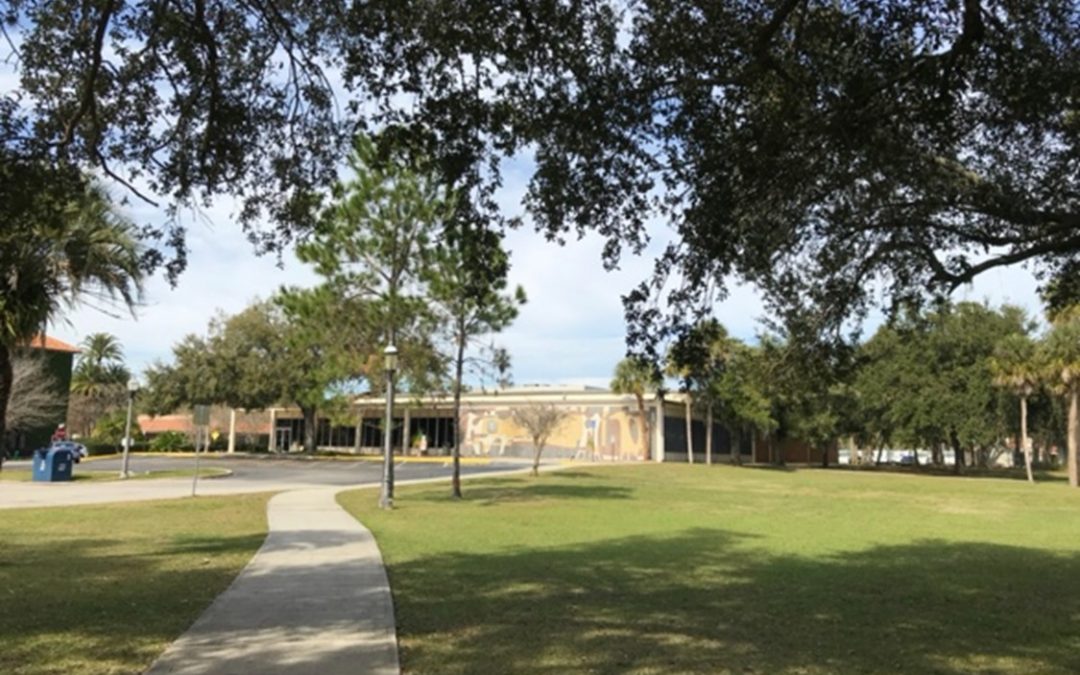
by Beth Kassab | Nov 26, 2024 | City Commission, Library, News, Uncategorized, Zoning and Development
City lets go of Post Office dream and will spend dollars elsewhere
The new spending plan for the Community Redevelopment Agency will focus on infrastructure that could help lure workforce housing near Interstate 4
Nov. 26, 2024
By Beth Kassab
After years of hoping the federal government would sell the land for the Winter Park Post Office on New York Avenue so that the city could expand Central Park, commissioners decided to use the money they saved for the purchase on other projects.
The nearly $7 million set aside in the Community Redevelopment Agency budget for the post office land will be used instead to help pay for a number of other needs such as intersection improvements at West Fairbanks Avenue and Denning Drive, new restrooms in the West Meadows and more.
Mayor Sheila DeCiccio noted in the meeting of the CRA board earlier this month that if the federal government ever does decide to sell the land, the city could finance the acquisition in other ways such as floating bonds.
She referenced how the Public Art Advisory Board is currently seeking permission to restore the historic mural on the side of the post office building — yet another project that will require the hard-to-comeby cooperation from the federal agency.
“The arts board is trying to clean up the mural and they will have to deal with them so good luck to them,” DeCiccio said.
With the reallocation of the post office funds and expected additional dollars as a result of the new expanded boundaries of the CRA down Fairbanks to Interstate 4, the board approved the outline of a new spending plan. The agency’s revenue is projected to be $9.1 million this year and grow to $10.4 million by 2029, according to city documents.
The spending plan includes:
- $10 million in 2028 and 2029 on U.S. 17-92 streetscape enhancements
- $5.1 million for MLK Park Improvements
- About $14 million on a variety of drainage, stormwater and other infrastructure improvements highlighted by recent studies to prevent flooding. The projects include MLK Park, West Fairbanks, Canton Avenue and Killarney Estates.
- $4.5 million for the intersection at Fairbanks and Denning, including the recently approved acquisition of land there.
- $1.2 million to add surface parking for the Library and Events Center.
- $1 million for a “Park Avenue Refresh.” The city is currently asking residents to fill out a survey that asks about satisfaction with landscaping, lighting, shade and other features.
- $1.2 million on construction of restrooms in the West Meadow of Central Park
City Manager Randy Knight said the improvements on West Fairbanks near I-4 in the newest area of the CRA have the potential to lead to big changes there.
“They lack the infrastructure for a serious redevelopment because of the flooding and septic there,” he said.
The work planned by the city along with potential new zoning will pave the way for more sweeping changes to the corridor and “we hope some workforce-type housing” in the area, Knight said.
WinterParkVoiceEditor@gmail.com
To comment or read comments from others, click here →


 The club’s general manager did not immediately return a call for comment on the new conditions.
The club’s general manager did not immediately return a call for comment on the new conditions.














Recent Comments